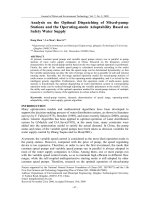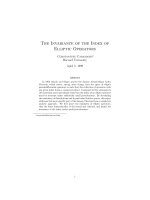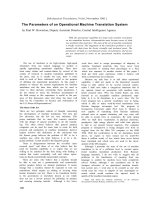The phantom of the opera
Bạn đang xem bản rút gọn của tài liệu. Xem và tải ngay bản đầy đủ của tài liệu tại đây (952.99 KB, 255 trang )
TheProjectGutenbergEBookofThePhantomoftheOpera,byGastonLeroux
ThiseBookisfortheuseofanyoneanywhereatnocostandwith
almostnorestrictionswhatsoever.Youmaycopyit,giveitawayor
re-useitunderthetermsoftheProjectGutenbergLicenseincluded
withthiseBookoronlineatwww.gutenberg.net
Title:ThePhantomoftheOpera
Author:GastonLeroux
ReleaseDate:June9,2008[EBook#175]
Language:English
***STARTOFTHISPROJECTGUTENBERGEBOOKTHEPHANTOMOFTHEOPERA***
ThePhantomoftheOpera
by
GastonLeroux
Authorof"TheMysteryoftheYellowRoom"and
"ThePerfumeoftheLadyinBlack"
Contents
Chapter
PROLOGUE
I ISITAGHOST?
II THENEWMARGARITA
III THEMYSTERIOUSREASON
IV BOXFIVE
V THEENCHANTEDVIOLIN
VI AVISITTOBOXFIVE
VII FAUSTANDWHATFOLLOWED
VIII THEMYSTERIOUSBROUGHAM
IX ATTHEMASKEDBALL
X FORGETTHENAMEOFTHEMAN'SVOICE
XI ABOVETHETRAP-DOORS
XII APOLLO'SLYRE
AMASTER-STROKEOFTHETRAP-DOOR
XIII
LOVER
XIV THESINGULARATTITUDEOFASAFETY-PIN
XV CHRISTINE!CHRISTINE!
XVI MME.GIRY'SREVELATIONS
XVII THESAFETY-PINAGAIN
THECOMMISSARY,THEVISCOUNTANDTHE
XVIII
PERSIAN
XIX THEVISCOUNTANDTHEPERSIAN
XX INTHECELLARSOFTHEOPERA
XXI INTERESTINGVICISSITUDES
XXII INTHETORTURECHAMBER
XXIII THETORTURESBEGIN
XXIV BARRELS!BARRELS!
XXV THESCORPIONORTHEGRASSHOPPER:WHICH
XXVI THEENDOFTHEGHOST'SLOVESTORY
EPILOGUE
(plusa"bonuschapter"called"THEPARISOPERA
HOUSE")
ThePhantomoftheOpera
Prologue
INWHICHTHEAUTHOROFTHISSINGULARWORKINFORMSTHE
READER HOW HE ACQUIRED THE CERTAINTY THAT THE OPERA
GHOSTREALLYEXISTED
TheOperaghostreallyexisted.Hewasnot,aswaslongbelieved,acreature
oftheimaginationoftheartists,thesuperstitionofthemanagers,oraproductof
the absurd and impressionable brains of the young ladies of the ballet, their
mothers, the box-keepers, the cloak-room attendants or the concierge. Yes, he
existed in flesh and blood, although he assumed the complete appearance of a
realphantom;thatistosay,ofaspectralshade.
When I began to ransack the archives of the National Academy of Music I
was at once struck by the surprising coincidences between the phenomena
ascribedtothe"ghost"andthemostextraordinaryandfantastictragedythatever
excitedtheParisupperclasses;andIsoonconceivedtheideathatthistragedy
mightreasonablybeexplainedbythephenomenainquestion.Theeventsdonot
date more than thirty years back; and it would not be difficult to find at the
presentday,inthefoyeroftheballet,oldmenofthehighestrespectability,men
upon whose word one could absolutely rely, who would remember as though
they happened yesterday the mysterious and dramatic conditions that attended
thekidnappingofChristineDaae,thedisappearanceoftheVicomtedeChagny
andthedeathofhiselderbrother,CountPhilippe,whosebodywasfoundonthe
bankofthelakethatexistsinthelowercellarsoftheOperaontheRue-Scribe
side.Butnoneofthosewitnesseshaduntilthatdaythoughtthattherewasany
reasonforconnectingthemoreorlesslegendaryfigureoftheOperaghostwith
thatterriblestory.
The truth was slow to enter my mind, puzzled by an inquiry that at every
momentwascomplicatedbyeventswhich,atfirstsight,mightbelookedupon
assuperhuman;andmorethanonceIwaswithinanaceofabandoningataskin
whichIwasexhaustingmyselfinthehopelesspursuitofavainimage.Atlast,I
received the proof that my presentiments had not deceived me, and I was
rewarded for all my efforts on the day when I acquired the certainty that the
Operaghostwasmorethanamereshade.
Onthatday,IhadspentlonghoursoverTHEMEMOIRSOFAMANAGER,
the light and frivolous work of the too-skeptical Moncharmin, who, during his
term at the Opera, understood nothing of the mysterious behavior of the ghost
andwhowasmakingallthefunofitthathecouldattheverymomentwhenhe
becamethefirstvictimofthecuriousfinancialoperationthatwentoninsidethe
"magicenvelope."
Ihadjustleftthelibraryindespair,whenImetthedelightfulacting-manager
of our National Academy, who stood chatting on a landing with a lively and
well-groomed little old man, to whom he introduced me gaily. The actingmanagerknewallaboutmyinvestigationsandhoweagerlyandunsuccessfullyI
hadbeentryingtodiscoverthewhereaboutsoftheexaminingmagistrateinthe
famousChagnycase,M.Faure.Nobodyknewwhathadbecomeofhim,aliveor
dead;andherehewasbackfromCanada,wherehehadspentfifteenyears,and
thefirstthinghehaddone,onhisreturntoParis,wastocometothesecretarial
offices at the Opera and ask for a free seat. The little old man was M. Faure
himself.
We spent a good part of the evening together and he told me the whole
Chagnycaseashehadunderstooditatthetime.Hewasboundtoconcludein
favor of the madness of the viscount and the accidental death of the elder
brother,forlackofevidencetothecontrary;buthewasneverthelesspersuaded
that a terrible tragedy had taken place between the two brothers in connection
with Christine Daae. He could not tell me what became of Christine or the
viscount.WhenImentionedtheghost,heonlylaughed.He,too,hadbeentold
of the curious manifestations that seemed to point to the existence of an
abnormalbeing,residinginoneofthemostmysteriouscornersoftheOpera,and
heknewthestoryoftheenvelope;buthehadneverseenanythinginitworthyof
hisattentionasmagistrateinchargeoftheChagnycase,anditwasasmuchas
he had done to listen to the evidence of a witness who appeared of his own
accordanddeclaredthathehadoftenmettheghost.Thiswitnesswasnoneother
than the man whom all Paris called the "Persian" and who was well-known to
everysubscribertotheOpera.Themagistratetookhimforavisionary.
I was immensely interested by this story of the Persian. I wanted, if there
were still time, to find this valuable and eccentric witness. My luck began to
improveandIdiscoveredhiminhislittleflatintheRuedeRivoli,wherehehad
lived ever since and where he died five months after my visit. I was at first
inclined to be suspicious; but when the Persian had told me, with child-like
candor, all that he knew about the ghost and had handed me the proofs of the
ghost's existence—including the strange correspondence of Christine Daae—to
do as I pleased with, I was no longer able to doubt. No, the ghost was not a
myth!
Ihave,Iknow,beentoldthatthiscorrespondencemayhavebeenforgedfrom
first to last by a man whose imagination had certainly been fed on the most
seductivetales;butfortunatelyIdiscoveredsomeofChristine'swritingoutside
the famous bundle of letters and, on a comparison between the two, all my
doubtswereremoved.IalsowentintothepasthistoryofthePersianandfound
that he was an upright man, incapable of inventing a story that might have
defeatedtheendsofjustice.
This,moreover,wastheopinionofthemoreseriouspeoplewho,atonetime
or other, were mixed up in the Chagny case, who were friends of the Chagny
family,towhomIshowedallmydocumentsandsetforthallmyinferences.In
thisconnection,IshouldliketoprintafewlineswhichIreceivedfromGeneral
D——:
SIR:
I can not urge you too strongly to publish the results of your inquiry. I
remember perfectly that, a few weeks before the disappearance of that great
singer,ChristineDaae,andthetragedywhichthrewthewholeoftheFaubourg
Saint-Germainintomourning,therewasagreatdealoftalk,inthefoyerofthe
ballet, on the subject of the "ghost;" and I believe that it only ceased to be
discussedinconsequenceofthelateraffairthatexcitedusallsogreatly.But,ifit
bepossible—as,afterhearingyou,Ibelieve—toexplainthetragedythroughthe
ghost,thenIbegyousir,totalktousabouttheghostagain.
Mysterious though the ghost may at first appear, he will always be more
easilyexplainedthanthedismalstoryinwhichmalevolentpeoplehavetriedto
picture two brothers killing each other who had worshiped each other all their
lives.
Believeme,etc.
Lastly,withmybundleofpapersinhand,Ioncemorewentovertheghost's
vast domain, the huge building which he had made his kingdom. All that my
eyes saw, all that my mind perceived, corroborated the Persian's documents
precisely; and a wonderful discovery crowned my labors in a very definite
fashion.Itwillberememberedthat,later,whendigginginthesubstructureofthe
Opera, before burying the phonographic records of the artist's voice, the
workmen laid bare a corpse. Well, I was at once able to prove that this corpse
wasthatoftheOperaghost.Imadetheacting-managerputthisprooftothetest
withhisownhand;anditisnowamatterofsupremeindifferencetomeifthe
paperspretendthatthebodywasthatofavictimoftheCommune.
Thewretcheswhoweremassacred,undertheCommune,inthecellarsofthe
Opera,werenotburiedonthisside;Iwilltellwheretheirskeletonscanbefound
in a spot not very far from that immense crypt which was stocked during the
siegewithallsortsofprovisions.IcameuponthistrackjustwhenIwaslooking
fortheremainsoftheOperaghost,whichIshouldneverhavediscoveredbutfor
theunheard-ofchancedescribedabove.
Butwewillreturntothecorpseandwhatoughttobedonewithit.Forthe
present, I must conclude this very necessary introduction by thanking M.
Mifroid(whowasthecommissaryofpolicecalledinforthefirstinvestigations
after the disappearance of Christine Daae), M. Remy, the late secretary, M.
Mercier, the late acting-manager, M. Gabriel, the late chorus-master, and more
particularly Mme. la Baronne de Castelot-Barbezac, who was once the "little
Meg"ofthestory(andwhoisnotashamedofit),themostcharmingstarofour
admirable corps de ballet, the eldest daughter of the worthy Mme. Giry, now
deceased, who had charge of the ghost's private box. All these were of the
greatestassistancetome;and,thankstothem,Ishallbeabletoreproducethose
hoursofsheerloveandterror,intheirsmallestdetails,beforethereader'seyes.
And I should be ungrateful indeed if I omitted, while standing on the
thresholdofthisdreadfulandveraciousstory,tothankthepresentmanagement
theOpera,whichhassokindlyassistedmeinallmyinquiries,andM.Messager
in particular, together with M. Gabion, the acting-manager, and that most
amiableofmen,thearchitectintrustedwiththepreservationofthebuilding,who
didnothesitatetolendmetheworksofCharlesGarnier,althoughhewasalmost
surethatIwouldneverreturnthemtohim.Lastly,Imustpayapublictributeto
the generosity of my friend and former collaborator, M. J. Le Croze, who
allowed me to dip into his splendid theatrical library and to borrow the rarest
editionsofbooksbywhichhesetgreatstore.
GASTONLEROUX.
ChapterIIsittheGhost?
ItwastheeveningonwhichMM.DebienneandPoligny,themanagersofthe
Opera, were giving a last gala performance to mark their retirement. Suddenly
the dressing-room of La Sorelli, one of the principal dancers, was invaded by
half-a-dozen young ladies of the ballet, who had come up from the stage after
"dancing"Polyeucte.Theyrushedinamidgreatconfusion,somegivingventto
forcedandunnaturallaughter,otherstocriesofterror.Sorelli,whowishedtobe
aloneforamomentto"runthrough"thespeechwhichshewastomaketothe
resigningmanagers,lookedaroundangrilyatthemadandtumultuouscrowd.It
waslittleJammes—thegirlwiththetip-tiltednose,theforget-me-noteyes,the
rose-red cheeks and the lily-white neck and shoulders—who gave the
explanationinatremblingvoice:
"It'stheghost!"Andshelockedthedoor.
Sorelli'sdressing-roomwasfittedupwithofficial,commonplaceelegance.A
pier-glass,asofa,adressing-tableandacupboardortwoprovidedthenecessary
furniture. On the walls hung a few engravings, relics of the mother, who had
known the glories of the old Opera in the Rue le Peletier; portraits of Vestris,
Gardel,Dupont,Bigottini.Buttheroomseemedapalacetothebratsofthecorps
de ballet, who were lodged in common dressing-rooms where they spent their
timesinging,quarreling,smackingthedressersandhair-dressersandbuyingone
anotherglassesofcassis,beer,orevenrhum,untilthecall-boy'sbellrang.
Sorelliwasvery superstitious.SheshudderedwhensheheardlittleJammes
speakoftheghost,calledhera"sillylittlefool"andthen,asshewasthefirstto
believeinghostsingeneral,andtheOperaghostinparticular,atonceaskedfor
details:
"Haveyouseenhim?"
"As plainly as I see you now!" said little Jammes, whose legs were giving
waybeneathher,andshedroppedwithamoanintoachair.
ThereuponlittleGiry—thegirlwitheyesblackassloes,hairblackasink,a
swarthycomplexionandapoorlittleskinstretchedoverpoorlittlebones—little
Giryadded:
"Ifthat'stheghost,he'sveryugly!"
"Oh,yes!"criedthechorusofballet-girls.
And they all began to talk together. The ghost had appeared to them in the
shape of a gentleman in dress-clothes, who had suddenly stood before them in
the passage, without their knowing where he came from. He seemed to have
comestraightthroughthewall.
"Pooh!"saidoneofthem,whohadmoreorlesskeptherhead."Youseethe
ghosteverywhere!"
Anditwastrue.Forseveralmonths,therehadbeennothingdiscussedatthe
Operabutthisghostindress-clotheswhostalkedaboutthebuilding,fromtopto
bottom,likeashadow,whospoketonobody,towhomnobodydaredspeakand
whovanishedassoonashewasseen,nooneknowinghoworwhere.Asbecame
arealghost,hemadenonoiseinwalking.Peoplebeganbylaughingandmaking
funofthisspecterdressedlikeamanoffashionoranundertaker;buttheghost
legendsoonswelledtoenormousproportionsamongthecorpsdeballet.Allthe
girlspretendedtohavemetthissupernaturalbeingmoreorlessoften.Andthose
who laughed the loudest were not the most at ease. When he did not show
himself, he betrayed his presence or his passing by accident, comic or serious,
forwhichthegeneralsuperstitionheldhimresponsible.Hadanyonemetwitha
fall,orsufferedapracticaljokeatthehandsofoneoftheothergirls,orlosta
powderpuff,itwasatoncethefaultoftheghost,oftheOperaghost.
Afterall,whohadseenhim?Youmeetsomanymenindress-clothesatthe
Opera who are not ghosts. But this dress-suit had a peculiarity of its own. It
covered a skeleton. At least, so the ballet-girls said. And, of course, it had a
death'shead.
Wasallthisserious?Thetruthisthattheideaoftheskeletoncamefromthe
descriptionoftheghostgivenbyJosephBuquet,thechiefscene-shifter,whohad
reallyseentheghost.Hehadrunupagainsttheghostonthelittlestaircase,by
thefootlights,whichleadsto"thecellars."Hehadseenhimforasecond—for
theghosthadfled—andtoanyonewhocaredtolistentohimhesaid:
"Heisextraordinarilythinandhisdress-coathangsonaskeletonframe.His
eyesaresodeepthatyoucanhardlyseethefixedpupils.Youjustseetwobig
black holes, as in a dead man's skull. His skin, which is stretched across his
bones like a drumhead, is not white, but a nasty yellow. His nose is so little
worthtalkingaboutthatyoucan'tseeitside-face;andTHEABSENCEofthat
noseisahorriblethingTOLOOKAT.Allthehairhehasisthreeorfourlong
darklocksonhisforeheadandbehindhisears."
This chief scene-shifter was a serious, sober, steady man, very slow at
imagining things. His words were received with interest and amazement; and
soontherewereotherpeopletosaythattheytoohadmetamanindress-clothes
with a death's head on his shoulders. Sensible men who had wind of the story
beganbysayingthatJosephBuquethadbeenthevictimofajokeplayedbyone
ofhisassistants.Andthen,oneaftertheother,therecameaseriesofincidentsso
curiousandsoinexplicablethattheveryshrewdestpeoplebegantofeeluneasy.
Forinstance,afiremanisabravefellow!Hefearsnothing,leastofallfire!
Well,thefiremaninquestion,whohadgonetomakearoundofinspectioninthe
cellars and who, it seems, had ventured a little farther than usual, suddenly
reappearedonthestage,pale,scared,trembling,withhiseyesstartingoutofhis
head,andpracticallyfaintedinthearmsoftheproudmotheroflittleJammes.[1]
Andwhy?Becausehehadseencomingtowardhim,ATTHELEVELOFHIS
HEAD, BUT WITHOUT A BODY ATTACHED TO IT, A HEAD OF FIRE!
And,asIsaid,afiremanisnotafraidoffire.
Thefireman'snamewasPampin.
Thecorpsdeballetwasflungintoconsternation.Atfirstsight,thisfieryhead
innowaycorrespondedwithJosephBuquet'sdescriptionoftheghost.Butthe
youngladiessoonpersuadedthemselvesthattheghosthadseveralheads,which
hechangedaboutashepleased.And,ofcourse,theyatonceimaginedthatthey
wereinthegreatestdanger.Onceafiremandidnothesitatetofaint,leadersand
front-rowandback-rowgirlsalikehadplentyofexcusesforthefrightthatmade
themquickentheir pacewhenpassingsomedarkcornerorill-lightedcorridor.
Sorelliherself,onthedayaftertheadventureofthefireman,placedahorseshoe
onthetableinfrontofthestage-door-keeper'sbox,whicheveryonewhoentered
theOperaotherwisethanasaspectatormusttouchbeforesettingfootonthefirst
treadofthestaircase.Thishorse-shoewasnotinventedbyme—anymorethan
any other part of this story, alas!—and may still be seen on the table in the
passageoutsidethestage-door-keeper'sbox,whenyouentertheOperathrough
thecourtknownastheCourdel'Administration.
Toreturntotheeveninginquestion.
"It'stheghost!"littleJammeshadcried.
Anagonizingsilencenowreignedinthedressing-room.Nothingwasheard
but the hard breathing of the girls. At last, Jammes, flinging herself upon the
farthestcornerofthewall,witheverymarkofrealterroronherface,whispered:
"Listen!"
Everybodyseemedtoheararustlingoutsidethedoor.Therewasnosoundof
footsteps.Itwaslikelightsilkslidingoverthepanel.Thenitstopped.
Sorellitriedtoshowmorepluckthantheothers.Shewentuptothedoorand,
inaquaveringvoice,asked:
"Who'sthere?"
But nobody answered. Then feeling all eyes upon her, watching her last
movement,shemadeanefforttoshowcourage,andsaidveryloudly:
"Isthereanyonebehindthedoor?"
"Oh,yes,yes!Ofcoursethereis!"criedthatlittledriedplumofaMegGiry,
heroicallyholdingSorellibackbyhergauzeskirt."Whateveryoudo,don'topen
thedoor!Oh,Lord,don'topenthedoor!"
ButSorelli,armedwithadaggerthatneverlefther,turnedthekeyanddrew
back the door, while the ballet-girls retreated to the inner dressing-room and
MegGirysighed:
"Mother!Mother!"
Sorellilookedintothepassagebravely.Itwasempty;agas-flame,initsglass
prison, cast a red and suspicious light into the surrounding darkness, without
succeedingindispellingit.Andthedancerslammedthedooragain,withadeep
sigh.
"No,"shesaid,"thereisnoonethere."
"Still,wesawhim!"Jammesdeclared,returningwithtimidlittlestepstoher
placebesideSorelli."Hemustbesomewhereprowlingabout.Ishan'tgobackto
dress.Wehadbetterallgodowntothefoyertogether,atonce,forthe'speech,'
andwewillcomeupagaintogether."
Andthechildreverentlytouchedthelittlecoralfinger-ringwhichsheworeas
acharmagainstbadluck,whileSorelli,stealthily,withthetipofherpinkright
thumb-nail, made a St. Andrew's cross on the wooden ring which adorned the
fourthfingerofherlefthand.Shesaidtothelittleballet-girls:
"Come,children,pullyourselvestogether!Idaresaynoonehaseverseenthe
ghost."
"Yes,yes,wesawhim—wesawhimjustnow!"criedthegirls."Hehadhis
death'sheadandhisdress-coat,justaswhenheappearedtoJosephBuquet!"
"And Gabriel saw him too!" said Jammes. "Only yesterday! Yesterday
afternoon—inbroadday-light——"
"Gabriel,thechorus-master?"
"Why,yes,didn'tyouknow?"
"Andhewaswearinghisdress-clothes,inbroaddaylight?"
"Who?Gabriel?"
"Why,no,theghost!"
"Certainly!Gabrieltoldmesohimself.That'swhatheknewhimby.Gabriel
was in the stage-manager's office. Suddenly the door opened and the Persian
entered.YouknowthePersianhastheevileye——"
"Oh, yes!" answered the little ballet-girls in chorus, warding off ill-luck by
pointingtheirforefingerandlittlefingerattheabsentPersian,whiletheirsecond
andthirdfingerswerebentonthepalmandhelddownbythethumb.
"AndyouknowhowsuperstitiousGabrielis,"continuedJammes."However,
he is always polite. When he meets the Persian, he just puts his hand in his
pocket and touches his keys. Well, the moment the Persian appeared in the
doorway,Gabrielgaveonejumpfromhischairtothelockofthecupboard,soas
to touch iron! In doing so, he tore a whole skirt of his overcoat on a nail.
Hurryingtogetoutoftheroom,hebangedhisforeheadagainstahat-pegand
gavehimselfahugebump;then,suddenlysteppingback,heskinnedhisarmon
the screen, near the piano; he tried to lean on the piano, but the lid fell on his
handsandcrushedhisfingers;herushedoutoftheofficelikeamadman,slipped
onthestaircaseandcamedownthewholeofthefirstflightonhisback.Iwas
justpassingwithmother.Wepickedhimup.Hewascoveredwithbruisesand
hisfacewasalloverblood.Wewerefrightenedoutofourlives,but,allatonce,
he began to thank Providence that he had got off so cheaply. Then he told us
what had frightened him. He had seen the ghost behind the Persian, THE
GHOSTWITHTHEDEATH'SHEADjustlikeJosephBuquet'sdescription!"
Jammes had told her story ever so quickly, as though the ghost were at her
heels,andwasquiteoutofbreathatthefinish.Asilencefollowed,whileSorelli
polishedhernailsingreatexcitement.ItwasbrokenbylittleGiry,whosaid:
"JosephBuquetwoulddobettertoholdhistongue."
"Whyshouldheholdhistongue?"askedsomebody.
"That's mother's opinion," replied Meg, lowering her voice and looking all
aboutherasthoughfearinglestotherearsthanthosepresentmightoverhear.
"Andwhyisityourmother'sopinion?"
"Hush!Mothersaystheghostdoesn'tlikebeingtalkedabout."
"Andwhydoesyourmothersayso?"
"Because—because—nothing—"
This reticence exasperated the curiosity of the young ladies, who crowded
roundlittleGiry,begginghertoexplainherself.Theywerethere,sidebyside,
leaning forward simultaneously in one movement of entreaty and fear,
communicatingtheirterrortooneanother,takingakeenpleasureinfeelingtheir
bloodfreezeintheirveins.
"Isworenottotell!"gaspedMeg.
But they left her no peace and promised to keep the secret, until Meg,
burningtosayallsheknew,began,withhereyesfixedonthedoor:
"Well,it'sbecauseoftheprivatebox."
"Whatprivatebox?"
"Theghost'sbox!"
"Hastheghostabox?Oh,dotellus,dotellus!"
"Notsoloud!"saidMeg."It'sBoxFive,youknow,theboxonthegrandtier,
nexttothestage-box,ontheleft."
"Oh,nonsense!"
"I tell you it is. Mother has charge of it. But you swear you won't say a
word?"
"Ofcourse,ofcourse."
"Well,that'stheghost'sbox.Noonehashaditforoveramonth,exceptthe
ghost,andordershavebeengivenatthebox-officethatitmustneverbesold."
"Anddoestheghostreallycomethere?"
"Yes."
"Thensomebodydoescome?"
"Why,no!Theghostcomes,butthereisnobodythere."
The little ballet-girls exchanged glances. If the ghost came to the box, he
must be seen, because he wore a dress-coat and a death's head. This was what
theytriedtomakeMegunderstand,butshereplied:
"That'sjustit!Theghostisnotseen.Andhehasnodress-coatandnohead!
All that talk about his death's head and his head of fire is nonsense! There's
nothinginit.Youonlyhearhimwhenheisinthebox.Motherhasneverseen
him,butshehasheardhim.Motherknows,becauseshegiveshimhisprogram."
Sorelliinterfered.
"Giry,child,you'regettingatus!"
ThereuponlittleGirybegantocry.
"Ioughttohaveheldmytongue—ifmotherevercametoknow!ButIwas
quite right, Joseph Buquet had no business to talk of things that don't concern
him—itwillbringhimbadluck—motherwassayingsolastnight——"
There was a sound of hurried and heavy footsteps in the passage and a
breathlessvoicecried:
"Cecile!Cecile!Areyouthere?"
"It'smother'svoice,"saidJammes."What'sthematter?"
Sheopenedthedoor.Arespectablelady,builtonthelinesofaPomeranian
grenadier,burstintothedressing-roomanddroppedgroaningintoavacantarmchair.Hereyesrolledmadlyinherbrick-dustcoloredface.
"Howawful!"shesaid."Howawful!"
"What?What?"
"JosephBuquet!"
"Whatabouthim?"
"JosephBuquetisdead!"
The room became filled with exclamations, with astonished outcries, with
scaredrequestsforexplanations.
"Yes,hewasfoundhanginginthethird-floorcellar!"
"It's the ghost!" little Giry blurted, as though in spite of herself; but she at
oncecorrectedherself,withherhandspressedtohermouth:"No,no!—I,didn't
sayit!—Ididn'tsayit!——"
Allaroundher,herpanic-strickencompanionsrepeatedundertheirbreaths:
"Yes—itmustbetheghost!"
Sorelliwasverypale.
"Ishallneverbeabletorecitemyspeech,"shesaid.
Ma Jammes gave her opinion, while she emptied a glass of liqueur that
happenedtobestandingonatable;theghostmusthavesomethingtodowithit.
The truth is that no one ever knew how Joseph Buquet met his death. The
verdict at the inquest was "natural suicide." In his Memoirs of Manager, M.
Moncharmin, one of the joint managers who succeeded MM. Debienne and
Poligny,describestheincidentasfollows:
"A grievous accident spoiled the little party which MM. Debienne and
Poligny gave to celebrate their retirement. I was in the manager's office, when
Mercier,theacting-manager,suddenlycamedartingin.Heseemedhalfmadand
told me that the body of a scene-shifter had been found hanging in the third
cellar under the stage, between a farm-house and a scene from the Roi de
Lahore.Ishouted:
"'Comeandcuthimdown!'
"BythetimeIhadrusheddownthestaircaseandtheJacob'sladder,theman
wasnolongerhangingfromhisrope!"
SothisisaneventwhichM.Moncharminthinksnatural.Amanhangsatthe
end of a rope; they go to cut him down; the rope has disappeared. Oh, M.
Moncharminfoundaverysimpleexplanation!Listentohim:
"It was just after the ballet; and leaders and dancing-girls lost no time in
takingtheirprecautionsagainsttheevileye."
Thereyouare!PicturethecorpsdeballetscuttlingdowntheJacob'sladder
and dividing the suicide's rope among themselves in less time than it takes to
write! When, on the other hand, I think of the exact spot where the body was
discovered—thethirdcellarunderneaththestage!—imaginethatSOMEBODY
musthavebeeninterestedinseeingthattheropedisappearedafterithadeffected
itspurpose;andtimewillshowifIamwrong.
The horrid news soon spread all over the Opera, where Joseph Buquet was
verypopular.Thedressing-roomsemptiedandtheballet-girls,crowdingaround
Sorelliliketimidsheeparoundtheirshepherdess,madeforthefoyerthroughthe
ill-litpassagesandstaircases,trottingasfastastheirlittlepinklegscouldcarry
them.
[1]Ihavetheanecdote,whichisquiteauthentic,fromM.PedroGailhardhimself,thelatemanagerofthe
Opera.
ChapterIITheNewMargarita
On the first landing, Sorelli ran against the Comte de Chagny, who was
comingup-stairs.Thecount,whowasgenerallysocalm,seemedgreatlyexcited.
"I was just going to you," he said, taking off his hat. "Oh, Sorelli, what an
evening!AndChristineDaae:whatatriumph!"
"Impossible!" said Meg Giry. "Six months ago, she used to sing like a
CROCK!Butdoletusgetby,mydearcount,"continuesthebrat,withasaucy
curtsey."Wearegoingtoinquireafterapoormanwhowas foundhangingby
theneck."
Just then the acting-manager came fussing past and stopped when he heard
thisremark.
"What!"heexclaimedroughly."Haveyougirlsheardalready?Well,please
forgetaboutitfortonight—andabovealldon'tletM.DebienneandM.Poligny
hear;itwouldupsetthemtoomuchontheirlastday."
Theyallwentontothefoyeroftheballet,whichwasalreadyfullofpeople.
TheComtedeChagnywasright;nogalaperformanceeverequalledthisone.All
the great composers of the day had conducted their own works in turns. Faure
andKrausshadsung;and,onthatevening,ChristineDaaehadrevealedhertrue
self,forthefirsttime,totheastonishedandenthusiasticaudience.Gounodhad
conductedtheFuneralMarchofaMarionnette;Reyer,hisbeautifulovertureto
Siguar;SaintSaens,theDanseMacabreandaReverieOrientale;Massenet,an
unpublishedHungarianmarch;Guiraud,hisCarnaval;Delibes,theValseLente
fromSylviaandthePizzicatifromCoppelia.Mlle.Krausshadsungtheboleroin
the Vespri Siciliani; and Mlle. Denise Bloch the drinking song in Lucrezia
Borgia.
But the real triumph was reserved for Christine Daae, who had begun by
singing a few passages from Romeo and Juliet. It was the first time that the
youngartistsanginthisworkofGounod,whichhadnotbeentransferredtothe
OperaandwhichwasrevivedattheOperaComiqueafterithadbeenproduced
attheoldTheatreLyriquebyMme.Carvalho.Thosewhoheardhersaythather
voice,inthesepassages,wasseraphic;butthiswasnothingtothesuperhuman
notesthatshegaveforthintheprisonsceneandthefinaltrioinFAUST,which
shesangintheplaceofLaCarlotta,whowasill.Noonehadeverheardorseen
anythinglikeit.
Daae revealed a new Margarita that night, a Margarita of a splendor, a
radiance hitherto unsuspected. The whole house went mad, rising to its feet,
shouting,cheering,clapping,whileChristinesobbedandfaintedinthearmsof
herfellow-singersandhadtobecarriedtoherdressing-room.Afewsubscribers,
however, protested. Why had so great a treasure been kept from them all that
time?Tillthen,ChristineDaaehadplayedagoodSiebeltoCarlotta'srathertoo
splendidly material Margarita. And it had needed Carlotta's incomprehensible
andinexcusableabsencefromthisgalanightforthelittleDaae,atamoment's
warning,toshowallthatshecoulddoinapartoftheprogramreservedforthe
Spanish diva! Well, what the subscribers wanted to know was, why had
Debienne and Poligny applied to Daae, when Carlotta was taken ill? Did they
know of her hidden genius? And, if they knew of it, why had they kept it
hidden?Andwhyhadshekeptithidden?Oddlyenough,shewasnotknownto
have a professor of singing at that moment. She had often said she meant to
practisealoneforthefuture.Thewholethingwasamystery.
TheComtedeChagny,standingupinhisbox,listenedtoallthisfrenzyand
tookpartinitbyloudlyapplauding.PhilippeGeorgesMarieComtedeChagny
was just forty-one years of age. He was a great aristocrat and a good-looking
man, above middle height and with attractive features, in spite of his hard
foreheadandhisrathercoldeyes.Hewasexquisitelypolitetothewomenanda
little haughty to the men, who did not always forgive him for his successes in
society. He had an excellent heart and an irreproachable conscience. On the
deathofoldCountPhilibert,hebecametheheadofoneoftheoldestandmost
distinguished families in France, whose arms dated back to the fourteenth
century.TheChagnysownedagreatdealofproperty;and,whentheoldcount,
who was a widower, died, it was no easy task for Philippe to accept the
managementofsolargeanestate.Histwosistersandhisbrother,Raoul,would
nothearofadivisionandwaivedtheirclaimtotheirshares,leavingthemselves
entirely in Philippe's hands, as though the right of primogeniture had never
ceased to exist. When the two sisters married, on the same day, they received
theirportionfromtheirbrother,notasathingrightfullybelongingtothem,but
asadowryforwhichtheythankedhim.
The Comtesse de Chagny, nee de Moerogis de La Martyniere, had died in
givingbirthtoRaoul,whowasborntwentyyearsafterhiselderbrother.Atthe
time of the old count's death, Raoul was twelve years of age. Philippe busied
himself actively with the youngster's education. He was admirably assisted in
thisworkfirstbyhissistersandafterwardbyanoldaunt,thewidowofanaval
officer, who lived at Brest and gave young Raoul a taste for the sea. The lad
entered the Borda training-ship, finished his course with honors and quietly
made his trip round the world. Thanks to powerful influence, he had just been
appointedamemberoftheofficialexpeditiononboardtheRequin,whichwasto
besenttotheArcticCircleinsearchofthesurvivorsoftheD'Artoi'sexpedition,
ofwhomnothinghadbeenheardforthreeyears.Meanwhile,hewasenjoyinga
longfurloughwhichwouldnotbeoverforsixmonths;andalreadythedowagers
of the Faubourg Saint-Germain were pitying the handsome and apparently
delicatestriplingforthehardworkinstoreforhim.
The shyness of the sailor-lad—I was almost saying his innocence—was
remarkable. He seemed to have but just left the women's apron-strings. As a
matter of fact, petted as he was by his two sisters and his old aunt, he had
retained from this purely feminine education manners that were almost candid
andstampedwithacharmthatnothinghadyetbeenabletosully.Hewasalittle
over twenty-one years of age and looked eighteen. He had a small, fair
mustache,beautifulblueeyesandacomplexionlikeagirl's.
PhilippespoiledRaoul.Tobeginwith,hewasveryproudofhimandpleased
to foresee a glorious career for his junior in the navy in which one of their
ancestors, the famous Chagny de La Roche, had held the rank of admiral. He
tookadvantageoftheyoungman'sleaveofabsencetoshowhimParis,withall
itsluxuriousandartisticdelights.Thecountconsideredthat,atRaoul'sage,itis
not good to be too good. Philippe himself had a character that was very wellbalancedinworkandpleasurealike;hisdemeanorwasalwaysfaultless;andhe
was incapable of setting his brother a bad example. He took him with him
whereverhewent.Heevenintroducedhimtothefoyeroftheballet.Iknowthat
thecountwassaidtobe"onterms"withSorelli.Butitcouldhardlybereckoned
asacrimeforthisnobleman,abachelor,withplentyofleisure,especiallysince
his sisters were settled, to come and spend an hour or two after dinner in the
company of a dancer, who, though not so very, very witty, had the finest eyes
thateverwereseen!And,besides,thereareplaceswhereatrueParisian,when
hehastherankoftheComtedeChagny,isboundtoshowhimself;andatthat
timethefoyeroftheballetattheOperawasoneofthoseplaces.
Lastly,Philippewouldperhapsnothavetakenhisbrotherbehindthescenes
oftheOperaifRaoulhadnotbeenthefirsttoaskhim,repeatedlyrenewinghis
requestwithagentleobstinacywhichthecountrememberedatalaterdate.
On that evening, Philippe, after applauding the Daae, turned to Raoul and
sawthathewasquitepale.
"Don'tyousee,"saidRaoul,"thatthewoman'sfainting?"
"Youlooklikefaintingyourself,"saidthecount."What'sthematter?"
ButRaoulhadrecoveredhimselfandwasstandingup.
"Let'sgoandsee,"hesaid,"sheneversanglikethatbefore."
The count gave his brother a curious smiling glance and seemed quite
pleased. They were soon at the door leading from the house to the stage.
Numbers of subscribers were slowly making their way through. Raoul tore his
gloves without knowing what he was doing and Philippe had much too kind a
hearttolaughathimforhisimpatience.ButhenowunderstoodwhyRaoulwas
absent-minded when spoken to and why he always tried to turn every
conversationtothesubjectoftheOpera.
Theyreachedthestageandpushedthrough thecrowdof gentlemen, sceneshifters,supersandchorus-girls,Raoulleadingtheway,feelingthathisheartno
longerbelongedtohim,hisfacesetwithpassion,whileCountPhilippefollowed
himwithdifficultyandcontinuedtosmile.Atthebackofthestage,Raoulhadto
stopbeforetheinrushofthelittletroopofballet-girlswhoblockedthepassage
which he was trying to enter. More than one chaffing phrase darted from little
made-up lips, to which he did not reply; and at last he was able to pass, and
dived into the semi-darkness of a corridor ringing with the name of "Daae!
Daae!"ThecountwassurprisedtofindthatRaoulknewtheway.Hehadnever
taken him to Christine's himself and came to the conclusion that Raoul must
have gone there alone while the count stayed talking in the foyer with Sorelli,
who often asked him to wait until it was her time to "go on" and sometimes
handedhimthelittlegaitersinwhichsherandownfromherdressing-roomto
preservethespotlessnessofhersatindancing-shoesandherflesh-coloredtights.
Sorellihadanexcuse;shehadlosthermother.
PostponinghisusualvisittoSorelliforafewminutes,thecountfollowedhis
brother down the passage that led to Daae's dressing-room and saw that it had
never been so crammed as on that evening, when the whole house seemed
excitedbyhersuccessandalsobyherfaintingfit.Forthegirlhadnotyetcome
to; and the doctor of the theater had just arrived at the moment when Raoul
enteredathisheels.Christine,therefore,receivedthefirstaidoftheone,while
openinghereyesinthearmsoftheother.Thecountandmanymoreremained
crowdinginthedoorway.
"Don't you think, Doctor, that those gentlemen had better clear the room?"
askedRaoulcoolly."There'snobreathinghere."
"You'requiteright,"saidthedoctor.
Andhesenteveryoneaway,exceptRaoulandthemaid,wholookedatRaoul
witheyesofthemostundisguisedastonishment.Shehadneverseenhimbefore
andyetdarednotquestionhim;andthedoctorimaginedthattheyoungmanwas
only acting as he did because he had the right to. The viscount, therefore,
remained in the room watching Christine as she slowly returned to life, while
even the joint managers, Debienne and Poligny, who had come to offer their
sympathyandcongratulations,foundthemselvesthrustintothepassageamong
the crowd of dandies. The Comte de Chagny, who was one of those standing
outside,laughed:
"Oh, the rogue, the rogue!" And he added, under his breath: "Those
youngsterswiththeirschool-girlairs!Sohe'saChagnyafterall!"
HeturnedtogotoSorelli'sdressing-room,butmetherontheway,withher
littletroopoftremblingballet-girls,aswehaveseen.
Meanwhile, Christine Daae uttered a deep sigh, which was answered by a
groan.Sheturnedherhead,sawRaoulandstarted.Shelookedatthedoctor,on
whomshebestowedasmile,thenathermaid,thenatRaoulagain.
"Monsieur,"shesaid,inavoicenotmuchaboveawhisper,"whoareyou?"
"Mademoiselle,"repliedtheyoungman,kneelingononekneeandpressinga
ferventkissonthediva'shand,"IAMTHELITTLEBOYWHOWENTINTO
THESEATORESCUEYOURSCARF."
Christine again looked at the doctor and the maid; and all three began to
laugh.
Raoulturnedveryredandstoodup.
"Mademoiselle,"hesaid,"sinceyouarepleasednottorecognizeme,Ishould
liketosaysomethingtoyouinprivate,somethingveryimportant."
"WhenIambetter,doyoumind?"Andhervoiceshook."Youhavebeenvery
good."
"Yes,youmustgo,"saidthedoctor,withhispleasantestsmile."Leavemeto
attendtomademoiselle."
"I am not ill now," said Christine suddenly, with strange and unexpected
energy.
Sheroseandpassedherhandoverhereyelids.









